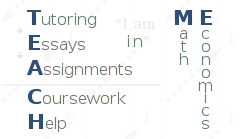Section 67: Direct Sums of Abelian Groups
is an abelian group.
Subgroups
,
, generate a group
if every element of
can be expressed as a finite sum of elements of the groups
:
. If for each element
of
the representation
where
for all but finite number of indices is unique,
is called the direct sum of the groups
:
.
- The sum is direct iff has a unique solution.
(extension condition for internal direct sums) If
is an abelian group, and
is a family of its subgroups that generate
, then
is the direct sum of
iff
given any abelian group
, and any family of homomorphisms
, there is a homomorphism
such that for every
,
.
Moreover, such
is unique.
- The direct sum of direct sums is a direct sum, in particular, is associative.
- If , then is isomorphic to .
Given a family of abelian groups
, an abelian group
is called the external direct sum of
(relative to monomorphisms
) if there are monomorphisms
such that
.
- There is always such a group , hence, there is always the external direct sum of any family of abelian groups.
- The external direct sum is defined uniquely up to isomorphism.
(extension condition for external direct sums) If
is an abelian group,
is a family of abelian groups, and
is a family of homomorphisms such that
generate
, then
each
is a monomorphism and
is the direct sum of
iff
given any abelian group
, and any family of homomorphisms
, there is a homomorphism
such that for every
,
.
Moreover, such
is unique.
Elements
of an abelian group
are said to generate the group
if they generate subgroups
that generate
. If each
is infinite cyclic, and
is the direct sum of
, then
is said to be a free abelian group having
as a basis. If the number of elements in a basis of
is finite, then this number is called the rank of
.
- The rank of is unique.
- Every subgroup of a free abelian group of rank is a free abelian group of rank at most .
-
The torsion subgroup of
is the set of all elements
of
having a finite order (
for some
).\begin_inset Separator latexpar\end_inset
- The torsion subgroup of a free abelian group is trivial.
- There are abelian groups that have trivial torsion subgroups, but which are not free.
(extension condition for free abelian groups) If
is an abelian group, and
is a family of its elements that generate
, then
is a free abelian group with basis
iff
given any abelian group
, and any family
of elements of
, there is a homomorphism
such that for every
,
.
Moreover, such
is unique.
